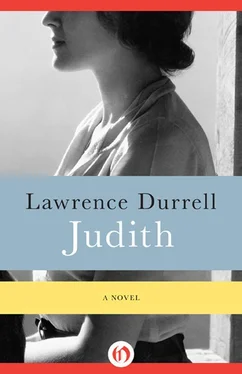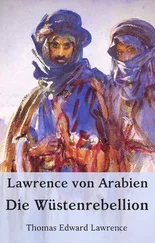“Not more than an hour,” he said in a creaky voice.
They crept along a corridor and confronted a stout door of oak barred with metal. David opened it and entered the prisoner’s cell — a narrow and rectangular room. A man sat playing patience at a table in the centre, smoking a cigarette in a bone cigarette holder. For a moment it did not look to her like the same man at all. His rumpled bed in the corner of the room was covered in daily papers. Grete, waiting in the shadows beyond the sill, saw David advance into the cell. The only light came from a single dusty bulb which threw an erratic circle of light on the table with its single occupant. The man wore no collar or tie; a metal stud gleamed in the neckband of his shirt. He looked up at the noise of the key turning in the lock, and then turned back to his game with an air of weary insolence.
David said, “I have brought someone who thinks they may recognize you as Günther Schiller.”
The prisoner’s face tied itself into a knot of nerves. A pure vexation ravaged him. He shouted:
“I have told you, you are mistaken. Get me the Swiss consul. I am not Schiller, but Schmidt.” He repeated the name, making as if to bang the table with his fist, and quietly went on with his game.
David stood for a moment contemplating him and then turned to the shadows.
“You may come in,” he said. His voice sounded indifferent — as if this were to be another routine interrogation by yet another prosecutor. He himself passed Grete and she heard the heavy door clang behind her as he went out.
Günther could as yet see nothing; he sat for a moment with eyes screwed up, staring at the darkness outside his little circle of light. Then he gave a grunt and returned to his game. He did not even look up when he heard her slow and hesitant footstep. Grete advanced towards the white circle of light with a strange feeling of confusion, of fear and hatred and disorientation. She walked with a slow, a fatal tread, like a sleepwalker, like an avenging fury — with a slow drugged tread towards the light. Then she felt the whiteness splash all over her features. The prisoner looked up briefly — and was suddenly riveted to his chair. His mouth fell open. Silver drops of sweat started up on his scalp along the white hair. He stared at the white-faced woman advancing towards him with this slow ineluctable tread; she might, for all he knew, be some ghost, some hallucination brought upon him by fatigue and fear. He stared at her and quickly glanced round the cell without moving his head, as if he were looking for an escape route. But his head stayed quite still on his shoulders. Only his little pig’s eyes darted about in his skull. Even when she passed out of his range of vision he did not turn round — so like a phantom did she seem. She described a slow circle about him, without for a moment taking her eyes off his face. He licked his lips and stayed rooted to his chair; all his jauntiness, all his bluster had leaked away now, and left him sitting there like some object washed down to the mouth of a river by floods. At last he breathed her name in a whisper — “Grete,” and in the same moment she turned aside like a bird in mid-flight and swooped softly down upon the table. She placed her hands on the rough surface and stared into those expressionless oyster eyes. He put out a hand and touched her, as if to verify that she was not a ghost.
“You are still alive,” he said in a low voice, and gave a small harsh chuckle. “I wondered.”
“Do you know why I am here?” she said, and her voice trembled as she spoke. He looked at her and a small bitter smile played about his lips. His composure was coming back and, with it, anger. A pulse had begun to beat in his temple. The cigarette smoke curled slowly up between them, hanging in whorls in the white light. Somewhere a mosquito droned.
“To trick me,” he said. “To revenge yourself.”
“No,” she cried sharply, stung into fury by his expression and even more by such obtuseness — for he could not imagine for a moment the force of her central obsession. She clenched her fingers tightly and said:
“Günther, where is Otto? Where is he?” For a moment the poignant entreaty of her huge eyes seemed to afflict him — they were so deep and blue — so full of long-endured chagrin and despair. He looked hastily away, as if to recover his poise, and when once more he stared at her it was with a bitterly curled lip, a grimness, an obduracy of heart which was quite frightening to behold.
“Otto!” he said with contempt, and made as if to spit on the floor beside the table. “Why should I tell you where he is?”
“So he is still alive?” With a frenzied gesture she leaned forward and shook him, grabbing at his shirt. “You must tell me please, Günther. He is all I have to live for now.” With an indignant thrust of his shoulder and a sweeping backhanded blow, he shook himself free and drove her reeling back against the wall. He shouted suddenly:
“Why should I tell you anything? Otto! You will never see him again — that I promise you.” He stood panting, with the muscles flickering over his face. He stared at her with contempt. Then, with an untrembling hand, he picked up his cigarette holder and placed it between his teeth as he sat down. She stayed quite still, leaning against the wall and watching him with a strange mixture of disgust and hatred.
“Günther,” she said. “Günther.”
He withdrew his cigarette holder and said crisply:
“You have simply come here to gloat over me and to persuade your Jewish compatriots to put me to death. Well, I am not afraid; you will not have that last satisfaction, Grete. I am not afraid .” The last words were uttered in a penetrating whisper which was blood-chilling. Suddenly her reserve broke down; extending her arms and almost sinking to a kneeling posture on the floor, she began to whine and plead with him, almost like an Arab. Her voice had become sweet and shrill.
“Surely you understand; it is not you, it is Otto I am talking about. Günther, you must tell me where he is. I will do anything. For the love of God, can’t you understand what it is to have a child, to have a son?”
“A Jew,” he said.
“A child, a child,” she almost howled, shaking her impotent fists in the air. Then, as so often in the past, the old sense of uselessness welled up in her. She covered her face with her hands and pressed her cold forehead to the wall, breathing deeply, trying to think.
She opened her eyes wide, staring as if into the very stones of the prison wall; slowly her composure returned and her eyes grew dreamy, speculative, thoughtful; she turned slowly and once more confronted the figure which sat upright over its cards, setting them out with small precise insect-like gestures. His forehead was still pearled with drops of sweat; but his expression was set and grim — the two lines running down from the corners of his mouth framing its obdurate mood. She moved slowly towards him again, but this time her face was calm and abstracted, her voice more curious than forceful. It was as if she were now repeating a formula without being sure whether it would work or not. Yet the words were fraught with a new kind of significance to him; he did not look up at her, but he did raise his head and ponder briefly as he stared at the edge of the table, beyond the coloured line of court cards. Her words, spoken with a puzzled slowness, were:
“If I could free you, Günther… if I could free you, you would tell me.”
She paused to see what effect this new idea might have upon him. He gave a short harsh bark of laughter — satirical laughter which disowned the validity of the idea; and yet… he did not move. He still stared at the table. Then he took up his cigarette holder and drew a mouthful of smoke from it which he softly launched into the darkness around the door, thinking deeply, almost voluptuously — as if the word itself had struck a note of music in his mind. She stared at him with the eyes of a Medusa. Slowly he turned his head, and his cold eyes met hers with their basilisk stare. For a long second neither spoke. She could hear the drone of a nearby mosquito; somewhere in the middle distance there was the noise of a radio playing Arab quarter-tones. Grete bent her rapt golden head towards him and said, with a queer note of triumph:
Читать дальше












